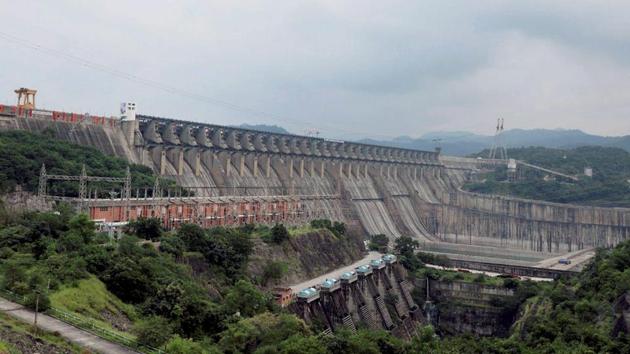Gujarat staring at water crisis this summer due to over dependence on Narmada Dam
The Gujarat government recently asked farmers to skip sowing summer crops and also plans to cut supply to industries.
Gujarat is staring at an acute water crisis this summer apparently due to its over dependence on the Narmada Dam to meet all its requirements.

Gujarat chief secretary J N Singh recently announced that due to less water available in the Narmada, they will not be able to provide water to industries, and they have asked local bodies to look for alternate sources this summer.
The Narmada River catchment areas, mainly in Madhya Pradesh, received less rainfall last monsoon and the western state has got only 45% of water in the Sardar Sarovar Dam than what it gets in normal monsoon years.
The state government recently asked farmers to skip sowing summer crops as it would not be able to provide irrigation water.
It also plans to cut supply to industries and has asked the administration of cities and villages dependent on the Narmada for drinking purpose to explore local sources.
“Yes, we need to change the perception that we are totally dependent on the Sardar Sarovar project on Narmada. The Naramda water should be seen as an add-on of local sources of water and not as the main source,” Gujarat chief minister’s adviser on water management, B N Navalawala, told PTI.
The Sardar Sarovar Dam on the river Narmada has been described as ‘Gujarat’s lifeline’ by leaders of the ruling BJP as it aims to provide drinking water to 131 urban centres and 9,633 villages (53% of total 18,144 state’s villages).
The dam is also expected to facilitate irrigation of 18.54 hectares of land covering 3,112 villages of 73 talukas in 15 districts of Gujarat.
Apart from providing water to so many towns and villages, the state government has embarked on an ambitious Saurashtra-Narmada Avataran Irrigation Yojna (Sauni Scheme) under which it plans to fill up 115 reservoirs of Saurashtra with the Narmada water.
The Sardar Sarovar dam’s foundation stone was laid on April 5, 1961 by the country’s first prime minister Jawaharlal Nehru. However, it took 56 years to complete its construction due to court cases and protests by the affected villagers.
The dam was inaugurated on September 17 last year by Prime Minister Narendra Modi.
After over 15 good years, when the state administration gradually learnt to depend on the Narmada for the water requirements, this year seems to be a wake up call.
Due to weak monsoon in Madhya Pradesh, Gujarat would only get 4.71 million acre feet (MAF) water, which is just 45% of the sanctioned supply of 9 MAF awarded by the Narmada Tribunal to the state, as per an official release.
A municipal official said it seems the state has ignored local sources, the ambitious Kalpsar project which aims to harness water of seven rivers by building a reservoir in the Gulf of Khambhat, and desalination plants.
The government may have thought that the Narmada river can provide water that is needed for the state, he said.
However, Navlawala, who is also heading the central task force for interlinking of rivers, said the state has been time and again exploring all options.
“There is a perception that Gujarat is totally dependent on the Narmada water, but we are working in all directions to mitigate the crisis that has come our way. All cities and towns which are now provided the Narmada water, earlier used to have their local source of water,” he said.
“We have asked administrators of cities to revive the local sources of water,” he said.
Regarding the Kalpsar project, Navalawala said, “As it is a one-of-its-kind project, we have to carry out many surveys which we expect to complete by the end of this year. We will then be able to prepare a detailed project report.”
On the desalination plants, he said the cost of water from it is very high and that water supply can be provided only in a limited sphere.
“But the state government has taken up the work of a plant for desalination of 105 million litres per day and tenders for it will soon be out,” he said.
However, Navalawala said due to climate change, the water scarcity in future cannot be ruled out, and states needs a paradigm shift in approach towards water management.
“We should move from demand driven supply to demand management. Recently, in one of the cities of South Africa which is facing drought, we were surprised by news that our cricketers were asked to take a shower for just two minutes.
“But it could be the order of the day in future in India too due to water scarcity,” he said.
Navlawala also stressed on water auditing and putting water meters in every house.
“Water auditing or water meters are inescapable. If you are not going to do it today, you will be compelled to do it tomorrow,” he added.
Get Current Updates on India News, Lok Sabha Election 2024 live, Elections 2024, Election 2024 Date along with Latest News and Top Headlines from India and around the world.



